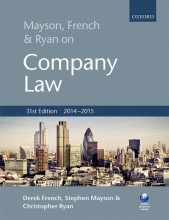Breach of Fiduciary Duty - The No-Conflict Rule - The Self-Dealing Rule
9 important questions on Breach of Fiduciary Duty - The No-Conflict Rule - The Self-Dealing Rule
Tito v Waddell (No.2) [1977]
Armstrong v Jackson
Pitt v Holt (Consequence of Breaching This Rule)
- Higher grades + faster learning
- Never study anything twice
- 100% sure, 100% understanding
Reason Why Self-Dealing Transactions are Voidable
Consequence of Breaching This Rule
Sargeant v National Westminster Bank plc
Exception to The Rule: Ex p James
*** The fairness of the transaction may be relevant when assessing whether the consent was indeed fully informed.
Wright v Morgan [1926]
Hillsdown Holdings plc v Pensions Ombudsman
***If this discretion is recognised generally, it has the potential to undermine the strict application of fiduciary duties generally and the self-dealing particularly.
The question on the page originate from the summary of the following study material:
- A unique study and practice tool
- Never study anything twice again
- Get the grades you hope for
- 100% sure, 100% understanding































